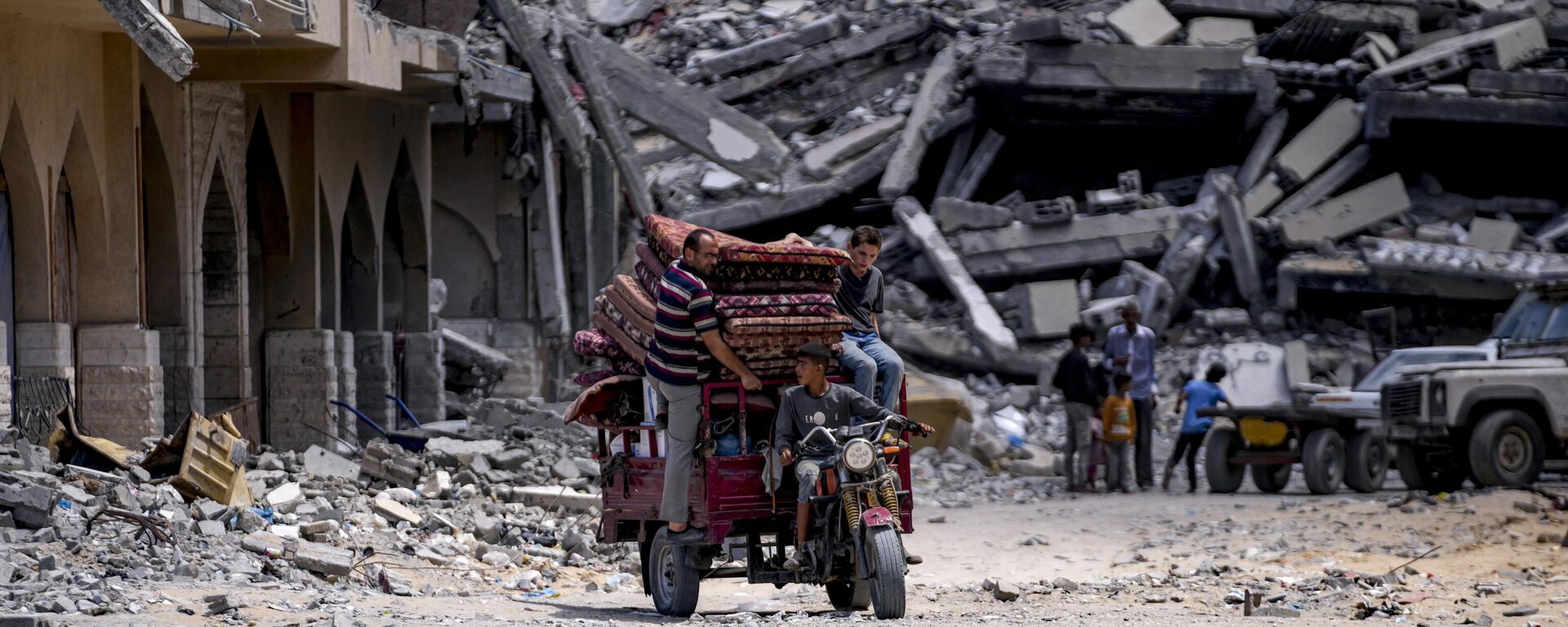https://sputnikglobe.com/20240821/bidens-desperation-for-foreign-policy-win-explains-why-blinken-jumped-the-gun-on-gaza-deal-1119862969.html
Biden’s Desperation for ‘Foreign Policy Win’ Explains Why Blinken Jumped the Gun on Gaza Deal
Biden’s Desperation for ‘Foreign Policy Win’ Explains Why Blinken Jumped the Gun on Gaza Deal
Sputnik International
“The US administration is particularly eager to announce an agreement, driven by both diplomatic and domestic pressures,” Dr. Imad Salamey, an assistant professor of political science at Lebanese American University, told Sputnik.
2024-08-21T18:07+0000
2024-08-21T18:07+0000
2024-08-21T18:07+0000
analysis
middle east
benjamin netanyahu
simon tsipis
antony blinken
israel
tel aviv
lebanon
hamas
democrats
https://cdn1.img.sputnikglobe.com/img/07e8/08/15/1119863121_0:157:3080:1890_1920x0_80_0_0_96fb6a649b509d7bc2e46bb2273c8f2d.jpg
“The US administration is particularly eager to announce an agreement, driven by both diplomatic and domestic pressures,” Dr. Imad Salamey, an assistant professor of political science at Lebanese American University, told Sputnik, commenting on why Israeli officials haven’t confirmed Tel Aviv’s readiness to accept the “bridging proposal” announced by Secretary Blinken on Monday.By contrast, “the Israeli government may face significant internal challenges regarding the deal,” the observer said. “Prime Minister Netanyahu’s government is deeply divided, and any official confirmation could exacerbate these divisions, potentially leading to resignations or even the collapse of the coalition. Thus, while the US is keen to publicize progress, Israel might be more cautious, weighing the domestic repercussions of any public acknowledgement of the agreement.”Blinken’s public announcement “could [also] be interpreted as a strategic move to exert public pressure on Israel,” according to the scholar. “The pressure serves multiple purposes: it advances US diplomatic interests in the region, reinforces the image of the US as a global leader, and garners domestic support by showcasing the administration’s proactive role,” Salamey said.Netanyahu Has No Interest in DealBut Israeli media reports indicate that the government has no intention of agreeing to the agreement announced by the US and “at least in Israel, it’s clear to everyone that there will be no deal,” Tel Aviv-based international affairs observer Dr. Simon Tsipis told Sputnik.“But in my view this is just an excuse for the fact that Netanyahu is not interested in making any deal with Hamas, no matter its contents,” the observer noted. Tsipis recalled that for Netanyahu, the conflict in Gaza has become not just a matter of his government’s political survival, but his personal freedom, given the multiple Israeli criminal investigations hanging over his head, which would inevitably resume if the conflict were brought to a peaceful conclusion.“Plus, it’s becoming increasingly clear to people whose relatives and friends are being held hostage by Hamas with each passing day that there are practically no more of them left alive. Yesterday, six bodies of hostages were pulled out of one of the tunnels. If earlier, several months ago, it was assumed that there were more than 220 of them being held there, now it’s assumed that there are no more than 100 still alive. The rest are dead, and the pressure inside Netanyahu is growing. By showing society that there are no more living hostages, he’s trying to let off the political pressure building up within Israeli society,” Tsipis said.As far as the US and Blinken’s hasty announcement of an agreement, Tsipis believes it’s tied to the fact that the Biden administration is effectively running on autopilot at this point after the president announced that he would not be seeking another term, and the Democrats began preparing Vice President Harris to take the reins.“These remaining months before the elections are accompanied by total confusion, and this, naturally, is reflected in US officials’ statements. The American side is now completely inactive and has virtually no influence, and this is felt in Israel too,” Tsipis said. “There is no pressure from the US because there is no one to apply this pressure, because even if the US is not yet in a state of anarchy, it is in a transitional period and has a kind of temporary government.”
https://sputnikglobe.com/20240820/philadelphi-corridor-gaza-war-negotiations-sticking-point-which-could-wreck-entire-peace-process-1119844008.html
https://sputnikglobe.com/20240820/israels-litany-of-new-conditions-ruined-hamas-ceasefire-deal---analyst-1119840655.html
https://sputnikglobe.com/20240818/hezbollah-has-150-bln-in-israeli-infrastructure-in-its-sights-may-have-flown-uav-over-bibis-house-1119813041.html
israel
tel aviv
lebanon
Sputnik International
feedback@sputniknews.com
+74956456601
MIA „Rossiya Segodnya“
2024
News
en_EN
Sputnik International
feedback@sputniknews.com
+74956456601
MIA „Rossiya Segodnya“
Sputnik International
feedback@sputniknews.com
+74956456601
MIA „Rossiya Segodnya“
why hasn't israel confirmed blinken's gaza deal, why has hamas rejected israel's gaza agreement, why is netanyahu against gaza peace deal
why hasn't israel confirmed blinken's gaza deal, why has hamas rejected israel's gaza agreement, why is netanyahu against gaza peace deal
Biden’s Desperation for ‘Foreign Policy Win’ Explains Why Blinken Jumped the Gun on Gaza Deal
Speaking to reporters Monday after his meeting with Benjamin Netanyahu, Secretary of State Blinken announced that the Israeli PM had accepted the US’s hostages-for-ceasefire “bridging proposal.” Israeli officials haven’t commented, while Hamas accused Tel Aviv of trying to sabotage the deal with intolerable new terms. Here’s what’s behind the mess.
“The US administration is particularly eager to announce an agreement, driven by both diplomatic and domestic pressures,” Dr. Imad Salamey, an assistant professor of political science at Lebanese American University, told Sputnik, commenting on why Israeli officials haven’t confirmed Tel Aviv’s readiness to accept the “bridging proposal” announced by Secretary Blinken on Monday.
“The Biden administration views the success of such an agreement as a potential foreign policy win, which could bolster its position ahead of upcoming elections,” Salamey explained.
By contrast, “the Israeli government may face significant internal challenges regarding the deal,” the observer said. “Prime Minister Netanyahu’s government is deeply divided, and any official confirmation could exacerbate these divisions, potentially leading to resignations or even the collapse of the coalition. Thus, while the US is keen to publicize progress, Israel might be more cautious, weighing the domestic repercussions of any public acknowledgement of the agreement.”
Blinken’s public announcement “could [also] be interpreted as a strategic move to exert public pressure on Israel,” according to the scholar. “The pressure serves multiple purposes: it advances US diplomatic interests in the region, reinforces the image of the US as a global leader, and garners domestic support by showcasing the administration’s proactive role,” Salamey said.
Netanyahu Has No Interest in Deal
But Israeli media reports indicate that the government has no intention of agreeing to the agreement announced by the US and “at least in Israel, it’s clear to everyone that there will be no deal,” Tel Aviv-based international affairs observer Dr. Simon Tsipis told Sputnik.
“Netanyahu has started to refer to the fact that the point of the agreement that does not suit him is the Hamas demand that Israel withdraw its troops from the Philadelphi Corridor border” between Gaza and Egypt Tsipis said, referring to Tel Aviv’s unwillingness to let go of the border area to prevent the resumption of arms smuggling.

20 August 2024, 15:16 GMT
“But in my view this is just an excuse for the fact that Netanyahu is not interested in making any deal with Hamas, no matter its contents,” the observer noted. Tsipis recalled that for Netanyahu, the conflict in Gaza has become not just a matter of his government’s political survival, but his personal freedom, given the multiple Israeli criminal investigations hanging over his head, which would inevitably resume if the conflict were brought to a peaceful conclusion.
“Plus, it’s becoming increasingly clear to people whose relatives and friends are being held hostage by Hamas with each passing day that there are practically no more of them left alive. Yesterday, six bodies of hostages were pulled out of one of the tunnels. If earlier, several months ago, it was assumed that there were more than 220 of them being held there, now it’s assumed that there are no more than 100 still alive. The rest are dead, and the pressure inside Netanyahu is growing. By showing society that there are no more living hostages, he’s trying to let off the political pressure building up within Israeli society,” Tsipis said.

20 August 2024, 11:50 GMT
As far as the US and Blinken’s hasty announcement of an agreement, Tsipis believes it’s tied to the fact that the Biden administration is effectively running on autopilot at this point after the president announced that he would not be seeking another term, and the Democrats began preparing Vice President Harris to take the reins.
“These remaining months before the elections are accompanied by total confusion, and this, naturally, is reflected in US officials’ statements. The American side is now completely inactive and has virtually no influence, and this is felt in Israel too,” Tsipis said. “There is no pressure from the US because there is no one to apply this pressure, because even if the US is not yet in a state of anarchy, it is in a transitional period and has a kind of temporary government.”
“Netanyahu’s government and he personally have been left to float freely. They do not depend on anyone and there’s no pressure on them from anyone. This is a dangerous situation, because returning to the above, Netanyahu’s main goal is his survival – political survival and simply remaining a free man. That could lead to a military escalation, and in fact, we are already on the threshold of an escalation and war with Lebanon,” Tsipis warned, pointing to the intense back-and-forth shelling across the Israel-Lebanon border in recent days.

18 August 2024, 14:17 GMT





